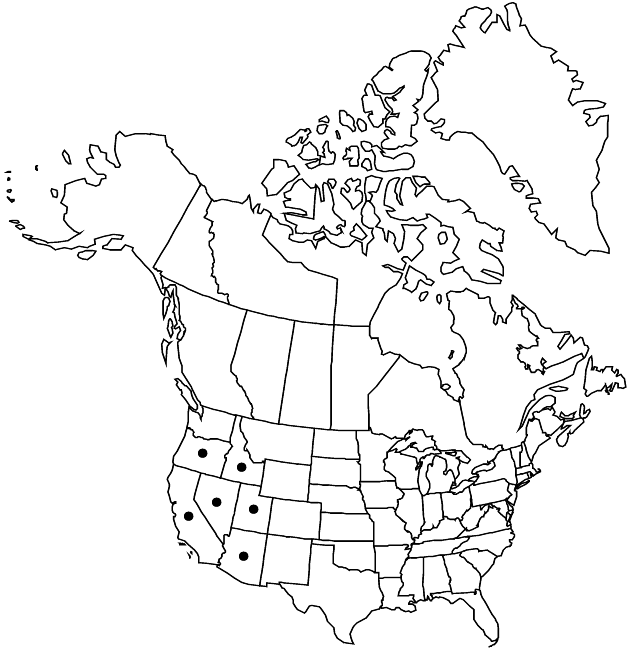Difference between revisions of "Hymenoxys cooperi"
Bull. Torrey Bot. Club 31: 494. 1904.
FNA>Volume Importer |
FNA>Volume Importer |
||
| Line 8: | Line 8: | ||
}} | }} | ||
|common_names=Cooper’s rubberweed or bitterweed | |common_names=Cooper’s rubberweed or bitterweed | ||
| − | |basionyms={{Treatment/ID/ | + | |basionyms={{Treatment/ID/Basionym |
|name=Actinella cooperi | |name=Actinella cooperi | ||
|authority=A. Gray | |authority=A. Gray | ||
| + | |publication_title=Proc. Amer. Acad. Arts | ||
| + | |publication_place=7: 359. 1868 | ||
}} | }} | ||
|synonyms={{Treatment/ID/Synonym | |synonyms={{Treatment/ID/Synonym | ||
| Line 30: | Line 32: | ||
|elevation=(1000–)1500–2500(–3500) m | |elevation=(1000–)1500–2500(–3500) m | ||
|distribution=Ariz.;Calif.;Idaho;Nev.;Oreg.;Utah. | |distribution=Ariz.;Calif.;Idaho;Nev.;Oreg.;Utah. | ||
| − | |discussion=<p>Some plants of <i>Hymenoxys cooperi</i>, mostly 10–40 cm with mostly 1–6 heads, have been called <i></i>var.<i> canescens</i>.</p> | + | |discussion=<p>Some plants of <i>Hymenoxys cooperi</i>, mostly 10–40 cm with mostly 1–6 heads, have been called <i></i></i>var.<i><i> canescens</i>.</p> |
|tables= | |tables= | ||
|references= | |references= | ||
| Line 54: | Line 56: | ||
|publication year=1904 | |publication year=1904 | ||
|special status= | |special status= | ||
| − | |source xml=https://jpend@bitbucket.org/aafc-mbb/fna-data-curation.git/src/ | + | |source xml=https://jpend@bitbucket.org/aafc-mbb/fna-data-curation.git/src/f6b125a955440c0872999024f038d74684f65921/coarse_grained_fna_xml/V19-20-21/V21_1109.xml |
|tribe=Asteraceae tribe Heliantheae | |tribe=Asteraceae tribe Heliantheae | ||
|subtribe=Asteraceae (tribe Heliantheae) subtribe Gaillardiinae | |subtribe=Asteraceae (tribe Heliantheae) subtribe Gaillardiinae | ||
Revision as of 18:46, 24 September 2019
Biennials or perennials, (10–)20–80(–100) cm (monocarpic; sometimes with sparingly branched, woody caudices). Stems 1–3(–15), usually purple-red-tinted proximally, sometimes purple-red-tinted throughout, branched distally, ± hairy. Leaves: blades simple or lobed (lobes 3–9), ± hairy, gland-dotted (basal leaf bases ± long-villous-woolly); mid leaves lobed (lobes 3–5, terminal lobes 1–2.5 mm wide). Heads (1–)7–45(–80) per plant, in paniculiform to corymbiform arrays. Peduncles (2–)3.5–8(–13) cm, ± hairy. Involucres subhemispheric to hemispheric, 8–10 × 10–17 mm. Phyllaries in 2 series, unequal; outer 8–15, basally connate 1/3–1/2 their lengths (moderately to strongly keeled), lanceolate, 4.5–8.9 mm, apices acuminate to acute; inner 14–22, obovate to oblanceolate, 4.1–6.8 mm, apices acuminate to mucronate. Ray florets 9–14; corollas yellow, 10.2–17(–21.5) × 4–7.5(–9.2) mm. Disc florets 30–150+; corollas 2.7–4.8 mm. Cypselae narrowly obpyramidal, 1.7–3.7 mm; pappi of 5–6(–8) obovate, aristate scales 1.3–3.3 mm. 2n = 30.
Phenology: Flowering May–Jun(–Sep).
Habitat: Roadsides, open areas, edges of juniper-pine forests
Elevation: (1000–)1500–2500(–3500) m
Distribution

Ariz., Calif., Idaho, Nev., Oreg., Utah.
Discussion
Some plants of Hymenoxys cooperi, mostly 10–40 cm with mostly 1–6 heads, have been called var. canescens.
Selected References
None.